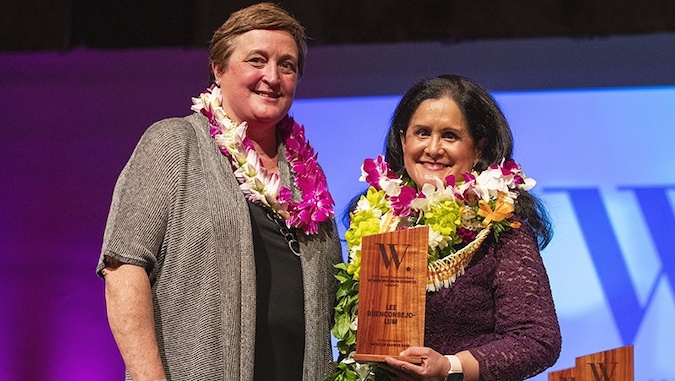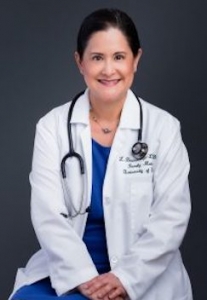
When you see something that isn’t right, you fix it.
That’s the idea that drove a 12-year-old Lee Buenconsejo-Lum to pursue a career in medicine after witnessing health disparities within the small town of Wahiawā, where she was born and raised.

“Even at that early age, when I didn’t know the terms health disparities or health inequities, I could see differences among myself, my classmates and other parts of Wahiawā. Poverty was affecting people differently. I thought that was something that wasnʻt right or fair—to have so many differences,” she said. “Access to quality healthcare should be for everyone, regardless of their background.”
Today, Buenconsejo-Lum remains dedicated to her lifelong goal of serving her community and other rural communities through her leadership at the University of Hawaiʻi at Mānoa John A. Burns School of Medicine (JABSOM) as the associate dean for academic affairs, director of graduate medical education and designated institutional official. She has also been the JABSOM lead and one of the primary UH liaisons to the Department of Health and the Hawaiʻi Emergency Management Agency on matters related to the COVID-19 response and post-pandemic planning since March 2020.
Award nomination
Her instrumental leadership role led to her selection by Pacific Business News (PBN) for its “Women Who Mean Business” awards held in October, celebrated among 40 of Hawaiʻi’s most successful and impactful business women across the state. Lt. Gov. Josh Green, JABSOM Dean Jerris Hedges and JABSOM Associate Dean for Administration, Finance and Operations Nancy Foster, nominated her.
Hedges and Foster stated, “Since the start of the pandemic, Dr. Lee Buenconsejo-Lum worked tirelessly with state public health leaders, national medical education leaders and university officials to ensure continuous education of all learners at JABSOM, safe and continued delivery of care by our medical students and 230 residents/fellows and to facilitate the introduction of a COVID vaccination program for the University of Hawaiʻi.”
The journey to academic medicine
By pursuing academic medicine full time, I felt that I could have a greater impact on the community.
—Buenconsejo-Lum
Growing up, Buenconsejo-Lum’s great-uncle, Timothy S. Wee, was one of only a handful of doctors serving the rural communities of Wahiawā, Haleʻiwa and Waialua on Oʻahu.
While attending Leilehua High School and during her summers in college, Buenconsejo-Lum worked in several physician offices, including his. She went on to earn her BS in biological sciences from Stanford University, then graduated with her MD from JABSOM in 1994. She stayed in Hawaiʻi to complete her specialty training with the UH family medicine residency program, which was located in Wahiawā and Mililani at the time.
Buenconsejo-Lum said that the doctors in Central Oʻahu had expected her to take over one of their practices, but in her second year of residency, she set her sights on academic medicine.
“By pursuing academic medicine full time, I felt that I could have a greater impact on the community by training medical students and future family doctors how to provide great care to all people and especially for those in rural or underserved areas,” said Buenconsejo-Lum, who joined JABSOM as a faculty member in 1997.
Buenconsejo-Lum served in several leadership roles in the Department of Family Medicine and Community Health, including residency program director before being appointed to her current position.
Her scholarly focus has been on eliminating disparities in health outcomes between majority populations in the U.S. and disenfranchised communities in Hawaiʻi and the U.S. Affiliated Pacific Island Jurisdictions.
On top of being a wife and mother, Buenconsejo-Lum wears many other professional hats, keeping busy in the administrative, teaching, research and clinical settings. However, she said it all comes down to the reason why she chose to specialize in family medicine: the breadth and love of being challenged.
“Each facet informs the other. For us to produce the type of physician that we need in this rapidly changing healthcare context, who learns how to provide high quality, team-based care and aims to understand and reduce health inequities—all of that requires a pretty good understanding of public health, the larger healthcare system and the power of community,” said Buenconsejo-Lum. “Creating the best learning environment for students and residents requires approaching education through the lens of health inequity and the eyes of our patients and families.”
See more on Buenconsejo-Lum on the JABSOM website.
—By Deborah Manog Dimaya

